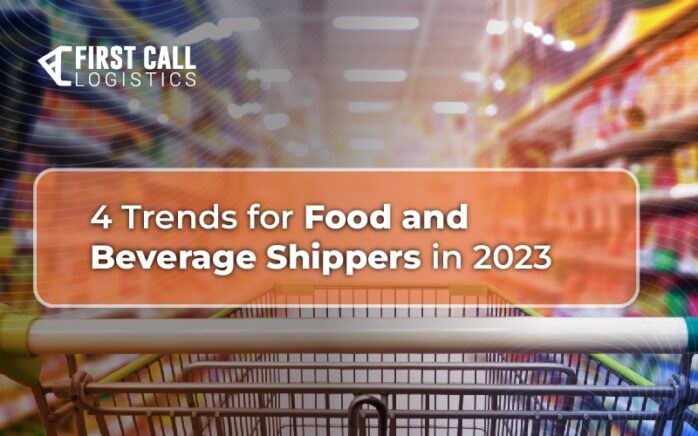4 Trends for Food and Beverage Shippers in 2023

Barren shelves, empty produce bins and sprints to grab the last bag of flour during early days of the pandemic are now (thankfully) in the rearview, but aren’t likely to be forgotten any time soon.
COVID’s widespread disruption to global logistics in 2020 forced the food and beverage industry to evaluate its supply chain practices from the ground up, and though many partners are working to actively shield themselves from future disruptions there remains plenty of work to be done as the market evolves.
Here are the four trends most likely to affect food and beverage partners in the year ahead:
1. Sourcing Closer to Home
The pandemic exposed just how dependent many U.S.-based companies had become on foreign exports. Worldwide labor shortages, factory closures and shipping delays resulted in the now-infamous product shortages and unhappy customers.
As a result, more companies are adopting nearshoring and near-sourcing practices. By investing in resources closer to home, food and beverage suppliers gain more direct control over a simplified supply chain.
Nearshoring also allows quicker, more flexible decisions regarding inventory. If a product is flying off the shelves, companies with products stored closer to the end destination can more efficiently react to increased demand. Other benefits include less excess inventory stored in warehouses or fulfillment centers and reducing overall waste as a result.
2. Digital Innovation
Digital innovations such as artificial intelligence (AI), automation and machine learning (ML) can analyze everything from past shipping statistics to potentially hazardous weather and traffic conditions. These valuable analytics can also assess shorter, more efficient routes to increase delivery capacity and become more fuel-efficient.
Technological solutions can even aid in a company’s ability to make more informed decisions about warehouse locations — in conjunction with AI, cognitive technologies and other advancements can help brands locate ideal warehouse or fulfillment locations for accelerated delivery schedules.
AI is expected to grow into a $6.5 billion dollar industry in 2023 — embracing AI and digital solutions will only serve logistics partners in optimizing supply chain operations.
3. Hybrid Routing
Historically, most food distributors follow static routes when making deliveries to their customers. Companies have come to expect (or require) predictable delivery times to keep things running optimally; however, a growing number of companies allow for a flexible delivery window.
Hybrid routing prioritizes customers with large orders and strict delivery windows to ensure continued customer satisfaction and promote a healthy business relationship. Deliveries to smaller, more flexible customers are then planned around these larger deliveries.
The use of AI comes in handy when planning these routes, as it can evaluate optimal paths to save time and fuel. The flexibility of hybrid routing also makes it easier to integrate last-minute changes in deliveries (ie. adding unexpected deliveries to your route).
4. Demand for Sustainable Options
In a recent survey, some 30% of respondents indicated that sustainability is “an integral part of my identity” or “a core value to me.” An additional 36% agreed with the statement: “Sustainability is important to me, and it is increasingly influencing some aspects of my daily life.”
To meet rising customer demand for carbon-neutral businesses, it’s essential for food and beverage distributors to instill more sustainable practices throughout their daily processes, be it through eco-friendly packaging, fuel-efficient vehicles or more sustainable growing practices.
If there’s one thing we’ve learned in recent years, it’s that adaptability and awareness of upcoming trends is essential for your business to stay competitive. By identifying weaknesses within the current supply chain model, food and beverage distributors can better fortify themselves against future roadblocks.
Simplify your Next Shipment with First Call Logistics
Building and managing cost-efficient supply chains is a full-time job. First Call’s rare combination of in-house assets, expert problem-solving and track record of stellar customer service makes us the 3PL of choice for business partners with a wide range of shipping needs.
More Resources for FCL Shippers:
- Article: The Latest in Food Supply Chain Safety
- Article: 5 Logistical Challenges Facing the Food and Beverage Industry
- Article: Safeguarding Your Business Against Logistics Fraud
- Article: The Importance of On-Time In-Full (OTIF) Delivery
- Article: Trends & Innovations in Final Mile Delivery Services
- Article: Route Optimization: Cutting Costs & Improving Service
- Article: What’s Ahead for Manufacturing Shipping Partners in 2023
Get the latest supply chain news and updates directly to your inbox.
